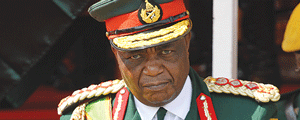
ZIMBABWE Defence Forces (ZDF) Commander General Constantine Chiwenga does not deserve to be the head of the military, but he is best suited for a position in Zanu PF’s politburo or central committee, the MDC-T has said.
Nduduzo Tshuma/ Everson Mushava
Responding to an attack on party leader Prime Minister Morgan Tsvangirai by Chiwenga, MDC-T deputy organising secretary Abednico Bhebhe yesterday said it was unfortunate that the army chief chose to be partisan, when he was supposed to be apolitical. The ZDF boss joined Police Commissioner-General Augustine Chihuri, who last week also launched a tirade against Tsvangirai.
“It is tragic that he (Chiwenga)says such things yet his mandate is to protect every Zimbabwean regardless of their political affiliation,” Bhebhe said. “He does not deserve to be in the Zimbabwe Defence Forces, but he deserves a post in a politburo or central committee of a certain political party.
“He should reform and speak on behalf of all Zimbabweans and not for a certain political party.”
MDC leader Welshman Ncube said this reinforced calls for State security sector realignment, as the ZDF was behaving like Zanu PF’s military wing.
“Instead of being a security force for the rest of the people, the army behaves as if it is a military wing of a political party,” Ncube said. “This is the point we had been stressing for the four years we have been in government. That is why we are turning to Sadc to ensure that these issues are solved before we can go to elections.”
On Saturday, Chiwenga described Tsvangirai as “a psychiatric patient and a sellout”, whom he would never meet.
- Chamisa under fire over US$120K donation
- Mavhunga puts DeMbare into Chibuku quarterfinals
- Pension funds bet on Cabora Bassa oilfields
- Councils defy govt fire tender directive
Keep Reading
This is the second attack on the Prime Minister in recent weeks by a top security official, after police chief Chihuri inferred that Tsvangirai was a malcontent. Critics of Zanu PF say Chiwenga’s remarks give credence to assertions that security sector reforms are paramount ahead of the pending harmonised elections.
The MDC-T accuses the military and the police of being complicit in the killing of more than 200 of their supporters in the run-up to the June 2008 presidential runoff election.
President Robert Mugabe has vehemently refused to tinker with the security sector, claiming it would be tantamount to effecting regime change.
Political analysts yesterday said the security chiefs were reaffirming their stance from the 2002 elections, where they said they would not salute anyone who did not fight in the liberation war.
“That is the repetition of a message we have been hearing that the security forces, or rather the few generals up there, will never respect Tsvangirai,” Effie Ncube, head of the National Association of Non-Governmental Organisations, said. “It shows that the security forces will never respect the wishes of the people in the event that Tsvangirai is voted into power. They are also in violation of the Constitution that clearly states that they should not be partisan.”
Dumisani Nkomo, a political analyst, echoed similar sentiments, saying the security chiefs were violating the Constitution.
“The security chiefs should respect the Constitution which stipulates that they salute the Head of State of the time, be it Tsvangirai, Welshman Ncube or anyone who will have been voted into power,” Nkomo said. “If they cannot respect the constitution, then they should resign. Otherwise they should not dabble into politics.”
Trevor Maisiri, of the International Crisis Group, said relations between Tsvangirai and the security chiefs soured as far back as the 2002 elections when they vowed never to salute the MDC-T leader in the event that he won.
“This relationship has continued to sour, mainly because the GPA (Global Political Agreement) failed to create a platform of engagement among the political parties and the security chiefs,” Maisiri said. “The National Security Council would have been the most appropriate platform to address any such challenges — but that institution never saw the light of day.
“The current mudslinging has also increased based on reports that quoted MDC’s Giles Mutsekwa as having claimed that he was meeting the security chiefs in private engagements,” he said. “If these meetings were really taking place, then the current slander is resulting from what the security chiefs may be considering to be unstrategic exposure by the MDC.”
Maisiri said the security chiefs had a reputation to protect and would not want to be seen to be engaging with the MDC-T behind Zanu PF’s back.
“At the same time, if no meetings took place and the MDC was misrepresenting issues, then what we are seeing could be venom coming from the security chiefs, which is motivated by what they see as attempts by the MDC to create internal suspicion and cause further divisions within the Zanu PF camp,” Maisiri said.







